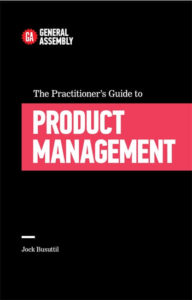
PRODUCTHEAD: Sometimes you just need to start over / Mental models
PRODUCTHEAD is a regular newsletter of product management goodness,
curated by Jock Busuttil.
morning product #
every PRODUCTHEAD edition is online for you to refer back to
tl;dr
The Prisoner’s Dilemma shows us that cooperation is a winning strategy in the long term
Faciliate more rational decision-making by helping stakeholders to understand the context better
A mental model is a compression of how something works, keeping key information and ignoring irrelevant detail
hello
Imagine you’re working on something, whether it’s writing an article or just trying to get some piece of technology to work the way you want to it to. You find yourself becoming increasingly bogged down. It’s just not happening. Although you’re trying to fix it as systematically as possible, each tweak causes a different new problem. It’s incredibly frustrating.
Sometimes you just need to start over.
Despite recreating (to your mind) exactly the same set of steps as before, this time around it magically works. You’re largely happy about this. Although if you’re like me, there’s always a little inquisitive voice at the back of your mind wondering what on earth you did differently. But you take the win regardless.
Here’s what I think is going on: the first time through I’m learning as I go, making mistakes and correcting them. Mostly. Because I’m still learning, I don’t fix each thing entirely. Over time those omissions accumulate like the random detritus on my desktop. Some of those overlooked mistakes interact with each other causing subtle and hard-to-diagnose side-effects. So I end up perplexed and bewildered. (A common state of mind for me.)
Then a bit like clearing my desktop, I start over.
Because I’ve actually learned a great deal from my first frustrating run through, it takes me a fraction of the time to get back to where I was. Except this time, my clean start has washed away whatever combination of mistakes I had originally missed.
It. Just. Works. (Win!)
In retrospect, the only mistake I really made was to wait so long before starting over. Maybe it’s the sunk cost fallacy at play.
Is this just me or do you find this relatable?
As with anything, I think you have to pick the right point at which to start over: too early and you’ve not made enough progress or learned enough to avoid repeating the same mistakes; too late and you’re just getting frustrated at your lack of progress.
Equally, don’t restart frivolously. If you’re still making decent progress and things are working well (or at least are only broken in ways you’re confident you can fix), don’t throw away your valuable investment — there’s far more that’s working than not. It’s wiser to continue to build on the foundation you’ve established than to chuck something broadly okay in the bin.
That’s been my week. How’s yours been?
For you this week #
My week has also been quite heavy on content that is product management-adjacent so I’m sharing what I’ve been reading, watching and listening to. They broadly relate to how you and other people take decisions.
The first is an episode from Derek Muller and the immensely popular Veritasium channel. It covers a famous problem from game theory, the Prisoner’s Dilemma. It goes on to explain why cooperation — being kind and forgiving without being a pushover — is a winning strategy. I can certainly think of situations from my career where this would have been a useful framing technique to help me figure out a sensible response to a conflict.
This led me to Isabel Gan’s article that share some thoughts on how product managers can usefully apply game theory in practice. It relies on the assumptions that 1) all the players know the rules of the game; 2) all players are rational decision makers; and 3) all players act in self-interest to maximise their pay-off.
She writes that when dealing with seemingly irrational stakeholders, we know that they’re likely to be acting in their own interests. Their irrationality could come from their misunderstanding of the rules of game (user needs, effectiveness of the product, market dynamics, competitive pressures and so on) in which your product is playing. You can therefore facilitate rationality and in turn greater cooperation by communicating more openly to ensure your stakeholders also understand the rules of the game.
In her article, Isabel also links to a list of mental models on the excellent Farnam Street blog. The summary of each mental model also links to a comprehensive and engaging article explaining its origin and application. My particular favourite at the moment is Hanlon’s Razor, which states that “we should not attribute to malice that which is more easily explained by stupidity”.
As a side note, if you want to challenge your thinking further, I also heartily endorse The Knowledge Project Podcast, in which Shane Parrish interviews the world’s top performers in their fields about how they frame their thinking and make decisions, also from Farnam Street. Enjoy!
Speak to you soon,
Jock
what to think about this week
What game theory reveals about life, the universe, and everything
This is a video about the most famous problem in game theory. Problems of this sort pop up everywhere, from nations locked in conflict to roommates doing the dishes. Even game shows have been based around this concept. Figuring out the best strategy can mean the difference between life and death, war and peace, flourishing and the destruction of the planet. And in the mechanics of this game, we may find the very source of one of the most unexpected phenomena in nature: cooperation.
Why ‘tit for tat’ is a winning strategy
[Veritasium / YouTube]
Mental models & product #1: game theory
A mental model is “a representation of how [we think the world] works”. It’s a framework, a concept, a worldview that we carry around in our minds that help guide our behaviours and perception. The more models we have in our heads as product thinkers, the bigger the toolbox we will have. As a product manager, there are many times we are required to make great decisions quickly. The more we train up and learn new mental models in our minds, the more we will be equipped to view the world objectively.
A toolkit to avoid making weak compromises
[Isabel Gan / Medium]
Mental models: the best way to make intelligent decisions (~100 models explained)
A mental model is a compression of how something works. Any idea, belief, or concept can be distilled down. Like a map, mental models reveal key information while ignoring irrelevant details. Models concentrate the world into understandable and useable chunks.
Mental models help us understand the world
[Farnham Street]
recent posts
Moving up to a CPO or VP Product role
Stepping up to a Chief Product Officer (CPO) or VP Product role doesn’t so much change what you do. Rather it amplifies everything. This guide lets you know what to expect.
Liberating and terrifying in equal measure
[I Manage Products]
I want to update my pricing strategy. Where do I start?
“My product currently has one tier of per-seat pricing for all customers. I want to change my pricing strategy to cater differently for SMEs and enterprise customers. Where do I start?”
A few pricing concepts to consider + further reading
[I Manage Products]
How do I make my product roadmap a better communication tool?
“My product roadmap is not getting the right information across to other people in my company. In particular, my customer success and marketing teams are struggling to plan their work for upcoming product releases. I’m also not sure how I can show my roadmap’s relationship to the half-yearly OKRs we set. How can I improve it?”
Your product roadmap is a communication tool
[I Manage Products]
can we help you?
Product People is a product management services company. We can help you through consultancy, training and coaching. Just contact us if you need our help!
Helping people build better products, more successfully, since 2012.
PRODUCTHEAD is a newsletter for product people of all varieties, and is lovingly crafted from the pleasant drip-feed of new ideas.


Leave a Reply